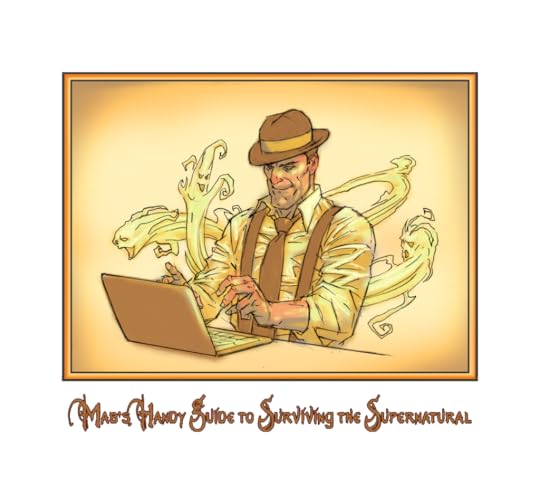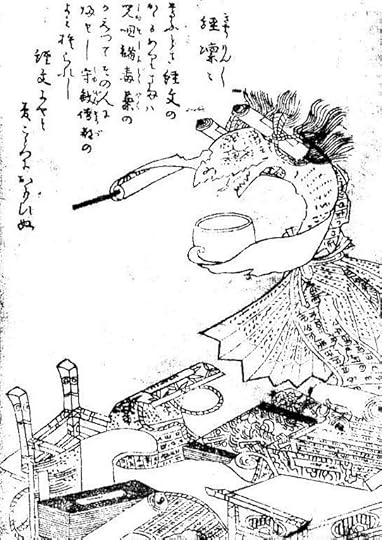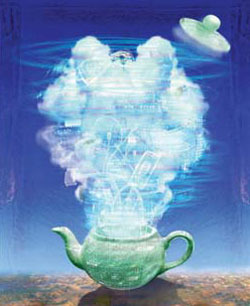L. Jagi Lamplighter's Blog, page 37
March 31, 2014
Caption This!
March 28, 2014
Dreams of Schemes–New Book Marketing Idea
I had a dream last night about book marketing…and when I woke up the first thing I read was:
"The prophet that hath a dream, let him tell a dream." (Jeremiah 33:26)
I dreamt that since the end user method of sales was not producing enough money for writers–due to the glut of free and cheep e-books–that ebooks started carrying advertising.
In the dream, cheap books had lots of ads. For another dollar or two, you could buy an ad-free one.
March 27, 2014
Mab’s Handy Guide to Surviving the Supernatural
Mab here, Prospero Inc. company gumshoe.
As part of my campaign to protect you woefully-uninformed humans from your own folly—in hopes of saving even one of you from an elf-induced death, or worse—here is some of my gathered wisdom concerning the supernatural world.
Read. Pay attention. And maybe you’ll live.
For those of you who are just coming in, we’ve started with Tsukumogami, Japanese household objects that wake up after their 100th birthday and become animate.
Name: Kyorinrin
Description: When ancient scrolls of wisdom sit around gathering dust, ignored by the humans who own them, they come together—compelled by the wisdom of the ages—and form a kind of goofy-looking dragon spirit. It’s kind of a vain thing. Puts its most ornate volumes on the outside, like a paper kimono or something. Even decorates with tassels. With its bird-like beak and long arms, it assaults the ignorant owners who ignored its priceless treasures and knowledge.
Where To Find It: Libraries, boxes in the attic, that kind of thing.
Frequency: Not that common. Wisdom is rare stuff.
Danger Level: Deadly…and musty.
Mab’s Eye View: Anyone who ignores wisdom isn’t going to listen to my warning any way. So, basically, they are toast. Just wave goodbye. And if you can’t bring yourself to read the books of wisdom in your keeping, at least dust them.
March 26, 2014
Wright’s Writing Corner: Payload Moment Reboot– Part One
Payload: Every scene/fight/sex scene should have some moment that moves the plot along or heightens awareness, drawing the reader into something greater. Villains should reveal something important during a fight, and romantic partners should learn more about each other or reveal secrets.
Also, every character should have at least one paragraph/scene where they reveal their inner motivation.
Payload. Probably the most important concept in these Writing Tips. If I had to rank them from most important to least important, this one would be number one.
Payload as expressed above falls into two categories: scene payload and character payload. Today, I will talk about scene payload and save character payload for a later post.
The Payload is that moment when the storyline intensifies and is raised to a higher level. It cane be caused by the revelation of unexpected turns of the plot, or the revelation of ideas on a deeper level than the story had previously touched.
I will give an example of this:
I recall an episode of a show we watched where the main character was to be executed by a rival. At the very last minute, as the curved blade lowers to strike the head off the poor imprisoned lad, the rival was struck by lightning. A character who was watching was seriously impressed by this (and by the fact that the kid about to lose his head smiled the whole time). He became convinced that destiny wanted this boy to live.
What was so impressive about this scene was that destiny had never been mentioned in this show…and we were on episode 52. Adding the question of whether some greater power might be on the main character’s side gave a whole new dimension to the story. It suddenly seemed deeper, wider, more important than it had before.
That was the Payload moment, not only for that episode, but for the entire season.
As in the example above, the Payload is the thing in the scene that makes the scene come alive, that makes you sit up and say “Wow”, that makes the story intensify or deepen. It can be something related to the general universe, like Heaven is on your side, or a twist of the plot, a new revelation about the nature of the situation.
Most Payload moments are like zing, a tiny jolt like you get when you touch a metal doorknob after walking on a carpet. John and I once watched a movie where the payload moments were so powerful, they were like the thunderous retort of a full-strength lightning bolt.
The movie was called The Five People You Meet In Heaven. I am going to use it below as an example, but PLEASE!!! If you think you might ever want to see this movie, skip this part of the article. The power of the story will be severely lessened if you already know what is coming.
Spoiler Alert
The Five People You Meet In Heaven proposes the idea that when you die, before you get to go on to Heaven, you meet five people who show you what your life really meant, who explain the mysteries you never understood in your life. The particular story is about a amusement park maintenance man named Eddie who has lived and worked at this park his entire life, except for a stint in WWII. He had had plans, dreams, but when he came back from the war with his leg permanently damaged, those dreams slipped away from him.
Eddie dies (trying to save a little girl) and he meets his first person, a blue-skinned man who was a freak at the carnival that was included with the amusement park when Eddie was a kid. We already know enough about Eddie’s life to know that this person was someone he only knew in passing. Yet, for some reason, this guy, not his brother or his mother, is the guy who meets him first.
The blue gentleman fills Eddie in on the five people thing and they chat a bit. Then, casually, Eddie asks, “How did you die?”
“You killed me,” the man says.
“You killed me.” With those words, suddenly everything changes. It is like being electrified. This blue man who meant nothing, a stranger chosen at random, is suddenly inexorably tied into Eddie’s life.
Eddie’s second person is his Captain from the war. They talk, they go over many things: what a good soldier Eddie was; what happened when their band of brothers got captured; the horrible way they were treated by their captors; how they escaped, how they burned the bamboo buildings they left behind; and the moment when Eddie’s leg got shot.
Finally, Eddie asks, “Why you, Captain, why are you the one here to talk to me?”
“Because I’m the one who shot you.”
This is the one that really hit us like a thunderbolt. (Probably the same thunderbolt that saved life of the character from the other show.) Suddenly, everything changed, everything about Eddie’s life from that point on became different.
The captain goes on to explain why he did it. I will not tell you. If you have seen the movie, you know. If you have not, you should not have read this far anyway.
Spoiler End
Not every Payload moment has to involve thunderbolts. But a good Payload moment will draw the reader further in to the story. They are the moments when the point of the whole thing becomes clear, the moment that rewards the reader for the effort made so far, the moment that draws the story together and makes it something more than an anecdote.
Ideally, every scene should have a payload moment…a moment that draws out the purpose of the scene and makes the story more worth reading than it was a scene ago.
How do you create Payload moments? That is another issue entirely. One we can discuss next week.
March 24, 2014
Caption This!
Caption This Winner!
We had a whole bunch of delightful captions this week. After a struggle, we chose winners in two catagories: general and geek.
General winner:
All the world's a cup of Joe.
Geek winner:
When you ask the Heart of Gold computer to brew a perfect cup of tea,
specify "without using the Improbability Drive.”
March 19, 2014
Wright’s Writing Corner: Dickens’ Trick
Dickens' Trick: Using action in description: “There is not just a kettle on the fire, it is boiling over.” "Horses at the cab stands are steaming in the cold and stamping. When people enter a room they are sneezing or hiding something in their pockets."
Hmm…this one is hard to write about because, while I love this idea, this tip is here to remind me to try it, not because I have mastered it.
So, this installment will be short.
The issue is that a scene is more interesting of something active is going on. The more active an action, the more dramatic and attention-drawing. A room with a kettle sitting on the counter is not as active as a room with a kettle on the fire. A room with a kettle on the fire is not as active as a room with a kettle boiling over.
I have not mastered this yet, but I have learned a related lesson. Scenes only come alive if there are two things going on at once. One trick for doing this in a scene that is mainly conversation is to have some kind of unrelated physical action going on at the same time—travel, a meal, cleaning, something. The dialogue can then be balanced by intriguing physical behaviors: walking too fast, stopping to tie a shoe, spreading arms to catch one’s balance on a rickety rock. The juxtaposition between the conversation and the effort to complete whatever the physical task is adds to the tension and drama of the scene.
I have another personal rule that is a bit like: “There is not just a kettle on the fire, it is boiling over.” But this would not apply to most books. I will share it with you, nonetheless:
If it can be done with magic, use magic.
When I was a kid, I always hated the fact that the fantasy books I read had almost no actual magic in them. Oh, they would talk about magic. They would hint at magic. One or two magical things might even happen. The rest, however, was just an ordinary story. Occasionally, there might be a fight scene with some magic flying, but that was about it.
For my Prospero’s Daughter series, I established the rule that if I could think of a way the characters could accomplish a thing using magic, they would use magic. If there was a choice between walking to the corner store for milk or teleporting there…well, who would walk if they could teleport, I ask you?
After all, why do we read fantasies, if not to be dazzled by fantastic wonder?
So, to conclude, when a you write a scene where a character walks into a room, do not settle for something mundane, such as a kettle on the fire. Instead, make it a magic cauldrons that is boiling over so vigorously that the colored smoke pouring from its bubbling surface is changing the knickknacks on the mantelpiece to birds.
March 18, 2014
Signal Boost Tuesday — Tony Ross
Today's Signal Boost is for Christian Thriller author Tony Ross.
Tony has two books out, Victor: the Reloaded Addition and Orion. Both books are stand-alones in the same background.
Victor: the Reloaded Addition: Mona's revolutionary discovery has been twisted by her former employer, who now threatens to unleash Hell on Earth. She flees with critical information in a desperate bid to stop him. Her only ally is an unusual detective pulled into a situation far beyond his ability to handle. Her only hope lies in unlocking the mind of the assassin pursuing her. Morality, science and the supernatural collide in this explosive thriller from Tony Ross.
Orion: David Johansen thought he'd escaped the violence of his past. He had no idea how wrong he was. Faced with a killer's deadly ultimatum, and trapped in an overcrowded, snowbound hotel, David must protect both a frightened young woman and the people of the small town he calls home…while confronting the darkest secrets of his heart. Orion is the suspenseful, page-turning sequel to the award-winning Victor: The Reloaded Edition.
You can click on the titles to see the books on Amazon.
March 17, 2014
Caption This!
Caption This Winner!
Last week's winner:
After handing over responsibilities to 2014 at the new year, 2013 has been living it up around the world. He has collected almost as many souvenirs as the current record holder, 2000.













